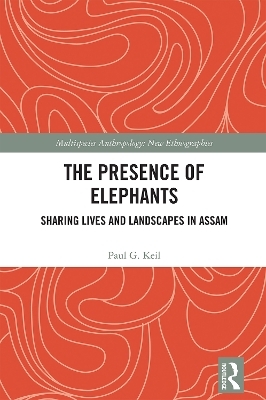
The Presence of Elephants
Sharing Lives and Landscapes in Assam
Seiten
2024
Routledge (Verlag)
978-1-032-49467-8 (ISBN)
Routledge (Verlag)
978-1-032-49467-8 (ISBN)
- Lieferbar (Termin unbekannt)
- Versandkostenfrei
- Auch auf Rechnung
- Artikel merken
How to dwell in a forest alongside giants, avoid disturbing a living god, assist an animal with their manners, and help an elephant cross the road. The Presence of Elephants is an anthropological consideration of coexistence, grounded in people’s everyday interactions with Asian elephants. Drawing on two years of ethnographic fieldwork in Assam, Northeast India, this book examines human–elephant copresence and how minds, tasks, identities, and places are shared between the two species. Sharing lives and landscapes with such formidable beings is a continuously shifting and negotiated exchange inherently composed of tensions, asymmetries, and uncertainties – especially in the Anthropocene when breakdowns in communication increasingly have a violent effect.
Developing a multifaceted picture of human–elephant relations in a postcolonial setting, each chapter focuses on a different dimension of encounter, where elephants adapt to human norms, people are subject to elephant projects, and novel interspecies possibilities emerge at the threshold of nature and society. Vulnerability is a common experience intensified in contemporary human–elephant relations, felt through the elephant’s power to disrupt and transform human lives, as well as the risks these endangered animals are exposed to. This book will be of interest to scholars of multispecies ethnography and human–animal relations, environmental humanities, conservation, and South Asian studies.
Developing a multifaceted picture of human–elephant relations in a postcolonial setting, each chapter focuses on a different dimension of encounter, where elephants adapt to human norms, people are subject to elephant projects, and novel interspecies possibilities emerge at the threshold of nature and society. Vulnerability is a common experience intensified in contemporary human–elephant relations, felt through the elephant’s power to disrupt and transform human lives, as well as the risks these endangered animals are exposed to. This book will be of interest to scholars of multispecies ethnography and human–animal relations, environmental humanities, conservation, and South Asian studies.
Paul G. Keil is a postdoctoral researcher at the Institute of Ethnology at the Czech Academy of Sciences and an honorary postdoctoral fellow with the Department of Anthropology, Macquarie University, Australia. He is the co-editor of Composing Worlds with Elephants: Interdisciplinary Dialogues.
Acknowledgements
Introduction
1 Exclusive landscape, fragmented relations
2 Exchanges with a hungry god
3 Scaffolding giants
4 Corresponding with wild neighbours
5 Collaborative solidarity and reclaiming the local
6 Conclusion
Bibliography
| Erscheinungsdatum | 11.09.2024 |
|---|---|
| Reihe/Serie | Multispecies Anthropology |
| Zusatzinfo | 31 Halftones, black and white; 31 Illustrations, black and white |
| Verlagsort | London |
| Sprache | englisch |
| Maße | 156 x 234 mm |
| Gewicht | 500 g |
| Themenwelt | Geisteswissenschaften ► Geschichte ► Regional- / Ländergeschichte |
| Naturwissenschaften ► Geowissenschaften ► Geografie / Kartografie | |
| Sozialwissenschaften ► Ethnologie | |
| Sozialwissenschaften ► Soziologie ► Spezielle Soziologien | |
| Technik ► Umwelttechnik / Biotechnologie | |
| ISBN-10 | 1-032-49467-0 / 1032494670 |
| ISBN-13 | 978-1-032-49467-8 / 9781032494678 |
| Zustand | Neuware |
| Haben Sie eine Frage zum Produkt? |
Mehr entdecken
aus dem Bereich
aus dem Bereich
Erinnerungen
Buch | Softcover (2024)
Pantheon (Verlag)
CHF 22,40


